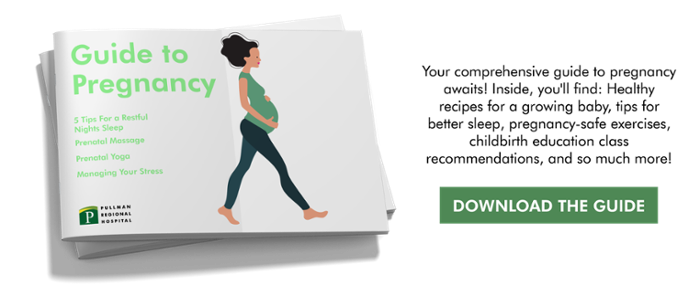Breastfeeding is a common and inexpensive means of nourishing your newborn. While this practice is not new, the benefits and practice of breastfeeding are better understood today than it was for your parents.
“Breast milk is a ‘living’ fluid and it is specifically designed for a human baby,” explains Laura Keough, a registered nurse and Certified Lactation Consultant at the Pullman Regional Hospital BirthPlace. “It changes as the baby grows. And, breast milk doesn’t just have nutrients for the baby to grow. It has antibodies and other living cells that help the baby fight infection, viruses, harmful bacteria, and pathogens.
There’s also stem cells and anti-cancer components in the breast milk. Enzymes and hormones that help your baby grow. Good bacteria exist in the breast milk, and it even has little packages of ‘food’ for that good bacteria so it can set up home in the baby’s gut and create a healthy gut microbiome. All of this helps the baby build a robust immune system.”
Starting to Breastfeed
When both baby and mother are stable immediately following childbirth, it is ideal to begin breastfeeding. Keogh speaks of putting baby directly on the mom’s chest for skin-to-skin contact so the newborn can initiate the process. Because your baby is new to this process, it can take an hour or two for the first feeding to be completed.
“Research shows that babies who spend this golden hour of skin-to-skin with their moms immediately after birth and initiate breastfeeding, that they will go on to breastfeed better and longer,” she notes. This process is recommended for both natural and caesarean section births.
To better prepare for your first feeding, consider taking a good breastfeeding class during your pregnancy such as the one offered at Pullman Regional Hospital. Breastfeeding support groups can also help you gauge your expectations for the breastfeeding experience. Lactation consultants are available to help you with any concerns or developing a feeding plan.
Consider taking a “baby moon” once baby is born. Keogh suggests limiting the visitors in your home, getting lots of skin-to-skin contact, and breastfeeding your baby as often as they want.
When to Breastfeed
Your best bet is to take cues from your baby. Most young babies need to breastfeed every one to three hours at a minimum of eight to 12 times a day. Frequent feedings alert your body to produce more milk and establish your supply.
Of course, baby isn’t always hungry when they want to feed. “It comforts them when they’re scared or lonely, and they breastfeed because maybe they’re in pain,” says Keogh.
“One of the great advantages of exclusively breastfeeding is that your baby doesn’t need anything but your milk for the first six months,” shares Keogh. When baby sits up unsupported and starts trying to put things in their mouth, consider introducing complementary foods. Keogh advises keeping breast milk on the menu for at least a full year, continuing it as long as you and baby wish.
Some mothers experience challenges with breastfeeding, and it can vary from child to child and mother to mother. It’s okay to call in reinforcements for support and advice. Lactation consultants can work with you to try multiple methods to help.
“In the end we’re here to help,” assures Keogh. “Lactation consultants are trained to help babies transition to the breast. We’re here to support moms and babies and get that going. Of course, some moms for personal reasons do choose to exclusively breast pump and bottle feed, so that is an option, too.”


